Authors & editors
ANU Press has collaborated with a diverse range of authors and editors across a wide variety of academic disciplines. Browse the ANU Press collection by author or editor.

Discretion and Public Benefit in a Regulatory Agency »
The Australian Authorisation Process
Authored by: Vijaya Nagarajan
Publication date: July 2013
This book explores the manner in which a variety of public benefits such as environmental protection and consumer safety have been accommodated through the authorisation process within competition law and policy in Australia. While the regulator’s use of its discretion can be explained as a triumph of practice over theory, this book explores the potential for competition principles to be imbued by the wider discourses of democratic participation and human rights. In doing so it makes a significant contribution to the Australian competition policy as well as reconceptualising the way in which discretion is used by regulators.
… a very important and creative contribution to the literatures on both business regulation in general and Australian competition and consumer protection law in particular. It pays special attention to an everyday regulatory function that is often ignored in scholarship. And it is very important in challenging—on both empirical and normative policy oriented grounds—a narrowly economic approach to competition law, and proposing an alternative understanding and practice for the public benefit test in ACCC authorisations.
— Professor Christine Parker
The data Vij Nagarajan has analysed is quite unique in its focus. It is a kind of data and analysis that has not been completed before in the international literature. It is well written, theoretically sophisticated and incisive in its policy analysis.
— John Braithwaite
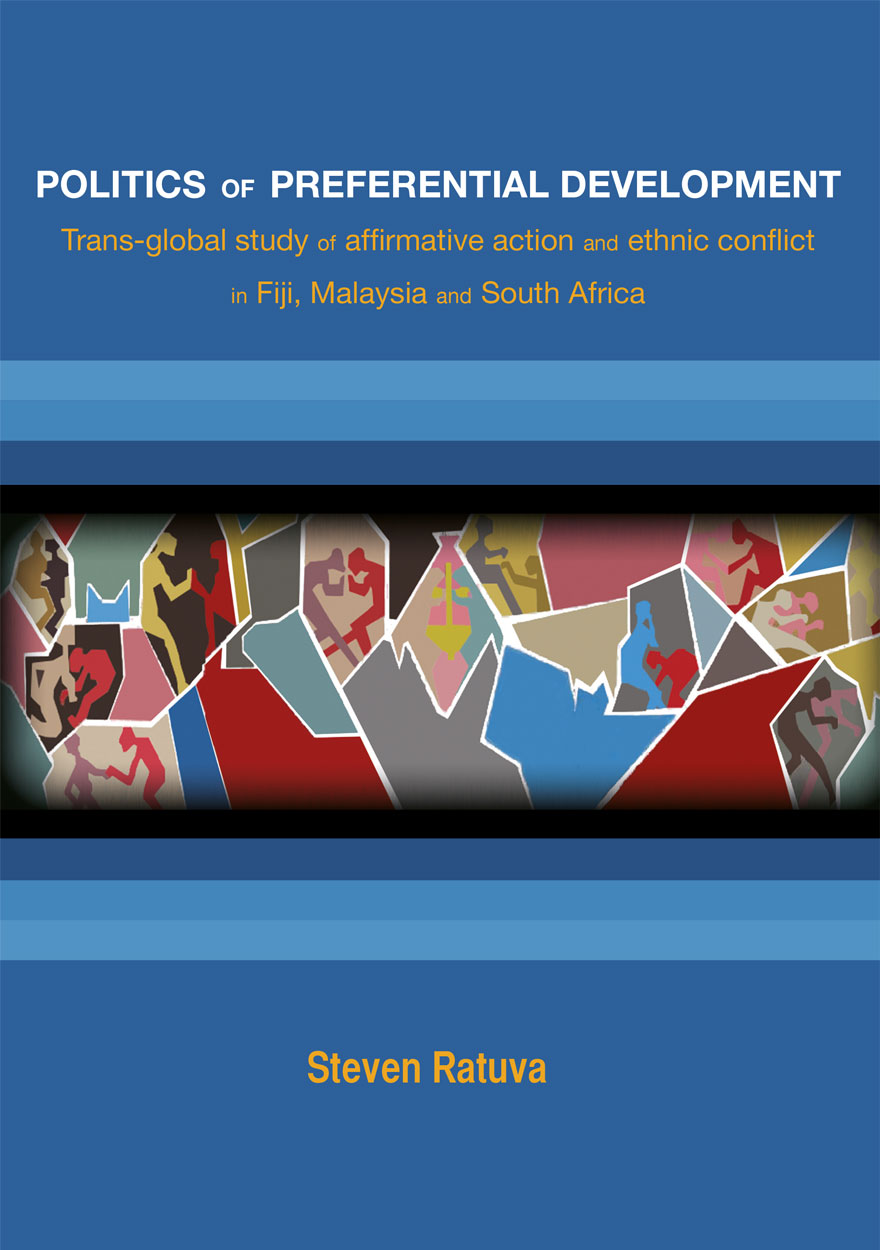
Politics of preferential development »
Trans-global study of affirmative action and ethnic conflict in Fiji, Malaysia and South Africa
Authored by: Steven Ratuva
Publication date: July 2013
The book is a critical examination of affirmative action, a form of preferential development often used to address the situation of disadvantaged groups. It uses a trans-global approach, as opposed to the comparative approach, to examine the relationship between affirmative action, ethnic conflict and the role of the state in Fiji, Malaysia and South Africa. While affirmative action has noble goals, there are often intervening political and ideological factors in the form of ethno-nationalism and elite interests, amongst others, which potentially undermine fair distribution of affirmative action resources. The book examines the affirmative action philosophies and programs of the three countries and raises pertinent questions about whether affirmative action has led to equality, social justice, harmony and political stability and explores future possibilities.
Steven Ratuva provides a brilliant critical study, not just of affirmative action policy and practice in three very different postcolonial contexts, but of the very complex matters of principle, justification and ideology that are involved more generally. It is an invaluable contribution to the literature on this important topic.
— Dr Stephanie Lawson, Professor of Politics and International Relations, Macquarie University.
Scholarly and provocative, Steven Ratuva’s Politics of Preferential Development is an original and insightful comparative contribution to the growing literature on affirmative action around the world.
— Dr Ralph Premdas, Professor of Public Policy, University of West Indies; Former Professor, University of California Berkeley and University of Toronto.

Agenda - A Journal of Policy Analysis and Reform: Volume 20, Number 1, 2013 »
Edited by: William Coleman
Publication date: July 2013
Agenda is a refereed, ECONLIT-indexed and RePEc-listed journal of the College of Business and Economics, The Australian National University. Launched in 1994, Agenda provides a forum for debate on public policy, mainly (but not exclusively) in Australia and New Zealand. It deals largely with economic issues but gives space to social and legal policy and also to the moral and philosophical foundations and implications of policy.
Subscribe to the Agenda Alerting service if you wish to be advised on forthcoming or new issues.
Download for free
Not available for purchase

Humanities Research: Volume XIX No. 2. 2013 »
The World and World-Making in Art
Edited by: Michelle Antoinette, Zara Stanhope, Caroline Turner
Publication date: July 2013
Humanities Research is an internationally peer-reviewed journal published by the Research School of Humanities at The Australian National University. The Research School of Humanities came into existence in January 2007 and consists of the Humanities Research Centre, Centre for Cross-Cultural Research, National Europe Centre and Australian National Dictionary Centre. Launched in 1997, issues are thematic with guest editors and address important and timely topics across all branches of the humanities.
Download for free
Not available for purchase
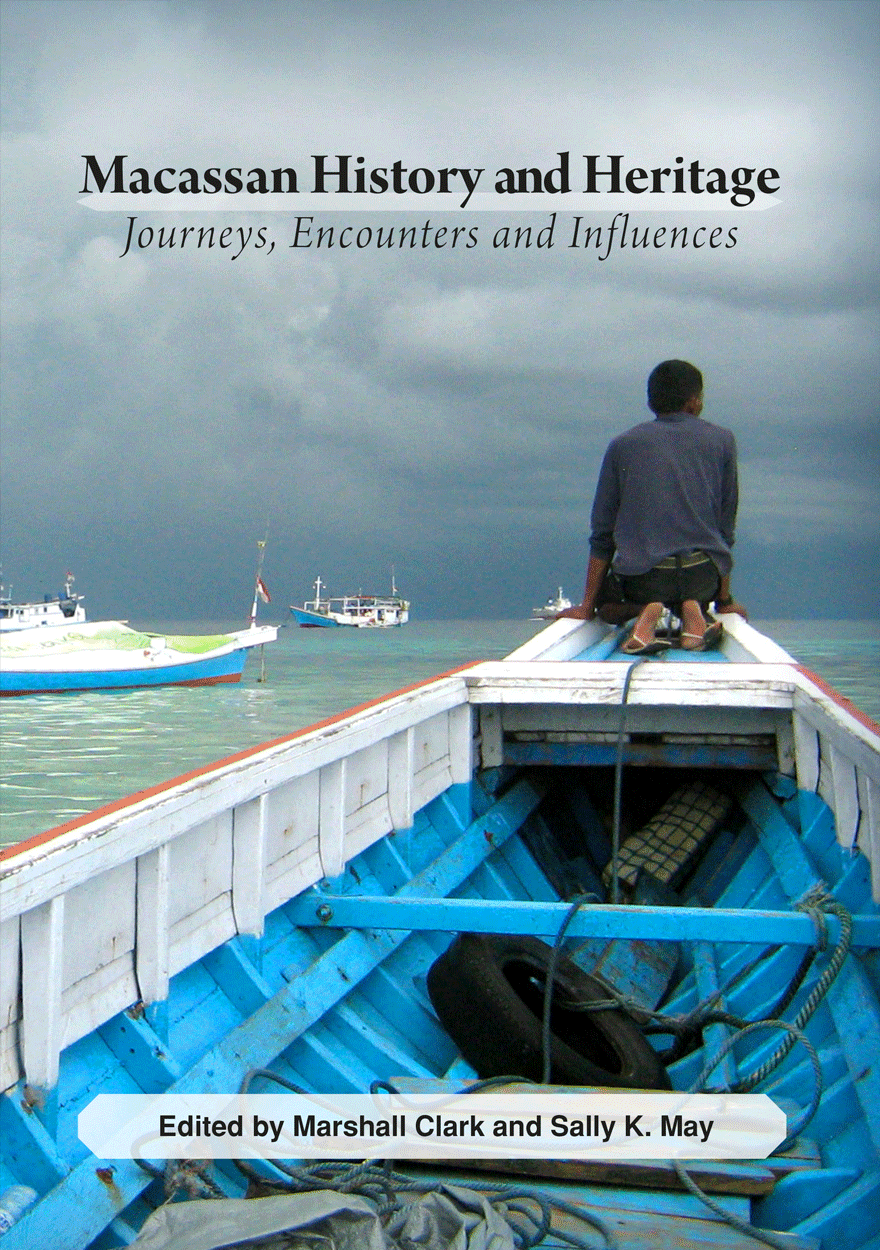
Macassan History and Heritage »
Journeys, Encounters and Influences
Edited by: Marshall Clark, Sally K. May
Publication date: June 2013
This book presents inter-disciplinary perspectives on the maritime journeys of the Macassan trepangers who sailed in fleets of wooden sailing vessels known as praus from the port city of Makassar in southern Sulawesi to the northern Australian coastline. These voyages date back to at least the 1700s and there is new evidence to suggest that the Macassan praus were visiting northern Australia even earlier. This book examines the Macassan journeys to and from Australia, their encounters with Indigenous communities in the north, as well as the ongoing social and cultural impact of these connections, both in Indonesia and Australia.

East Asia Forum Quarterly: Volume 5, Number 2, 2013 »
Publication date: June 2013
East Asia Forum Quarterly grew out of East Asia Forum (EAF) online, which has developed a reputation for providing a platform for the best in Asian analysis, research and policy comment on the Asia Pacific region in world affairs. EAFQ aims to provide a further window onto research in the leading research institutes in Asia and to provide expert comment on current developments within the region. The East Asia Forum Quarterly, like East Asia Forum online, is an initiative of the East Asia Forum (EAF) and its host organisation, the East Asian Bureau of Economic Research (EABER) in the Crawford School of Economics and Government in the College of Asia & the Pacific at The Australian National University.
Download for free
Not available for purchase

Asia-Pacific Security »
Policy Challenges
Edited by: David W. Lovell
Publication date: May 2013
Since September 11, 2001, our newspapers have been filled with the ‘war on terror’; our governments have mobilised their resources for ‘homeland security’; and people everywhere are braced for more terrorist attacks.
Yet while the new threat is genuine, we must not lose sight of the continuing security concerns in the Asia-Pacific. Tensions persist on the Korean peninsula, in the Taiwan Straits and the South China Sea, and in Kashmir. The region is well supplied with weapons of mass destruction and may face an arms race, and there are a range of pressing human security issues. Likewise, the strategic realities of the region remain linked with US power, and with the emergence of China as a key regional player.
The book examines the developing strategic relationships in the region, and clarifies the dilemmas for Australian policy-makers as they try to balance genuine engagement with the region against a long-standing and valued alliance with the United States.
Emerging from discussions between the Shanghai Institute for International Studies and the University of New South Wales at ADFA, Asia-Pacific Security has a particular relevance for foreign-policy professionals and scholars of the region.
Printed copies of this book may be ordered from ISEAS publishing.

France in the South Pacific »
Power and Politics
Authored by: Denise Fisher
Publication date: May 2013
France is a Pacific power, with three territories, a military presence, and extensive investments. Once seen by many as a colonial interloper in the South Pacific, by the early 2000s, after it ended nuclear testing in French Polynesia and negotiated transitional Accords responding to independence demands in New Caledonia, France seems to have become generally accepted as a regional partner, even if its efforts concentrate on its own territories rather than the independent island states.
But France’s future in the region has yet to be secured. By 2014 it is to have handed over a set of agreed autonomies to the New Caledonian government, before an independence referendum process begins. Past experience suggests that a final resolution of the status of New Caledonia will be divisive and could lead once again to violent confrontations. In French Polynesia, calls continue for independence and for treatment under UN decolonisation procedures, which France opposes. Other island leaders are watching, so far putting faith in the Noumea Accord, but wary of the final stages. The issues and possible solutions are more complex than the French Pacific island population of 515,000 would suggest.
Combining historical background with political and economic analysis, this comprehensive study offers vital insight into the intricate history – and problematic future – of several of Australia’s key neighbours in the Pacific and to the priorities and options of the European country that still rules them. It is aimed at policy-makers, scholars, journalists, businesspeople, and others who want to familiarise themselves with the issues as France’s role in the region is redefined in the years to come.

A Good Life »
Human rights and encounters with modernity
Authored by: Mary Edmunds
Publication date: May 2013
This book is a story. It’s a story about ordinary people in very different parts of the world dealing with rapid change in the late twentieth and early twenty-first centuries. It’s about times of turbulent and violent social upheaval and rupture with the past. It’s about modern times. It’s also about being human; what it is to be human in a modernising and globalising world; how, in responding to the circumstances of their times, different groups define, redefine, and attempt to put into practice their understandings of the good and of what constitutes a good life. And it’s about how human rights have come to be not abstract universal principles but a practical source of consciousness and practice for real people.
Drawing on the author’s experience as an anthropologist, the book examines different groups over the last three decades of the twentieth century and the first years of the twenty-first: Thai factory workers over a period of two coups in the 1970s; Spanish nuns in the 1980s, in the aftermath of the Second Vatican Council and the end of the Franco dictatorship; Aboriginal people in the remote Pilbara region of Western Australia dealing with the impact of late colonialism and moves towards self-determination, from the 1980s to the present. Each of these groups has its own stories, illuminating ways in which, despite the assault of modernisation on deeply held traditional beliefs and practices, particular cultural understandings and practices continue to shape people’s responses to their novel circumstances. The very diversity of the studies presented in the book raises some of the most compelling moral and social questions of our time and invites the reader, both academic and lay, to focus on what it is that makes us human; whether there are human universals as well as cultural particularities; whether human rights provide universal norms and practices; what unites as well as divides us; and where morality, and understandings of a good life, can be sourced in a secular modern world.
“This is a book about hope, the hope that we have ways to live together in a rapidly changing world which will enable us to ‘live a good life in the modern world.’”
Hon. Fred Chaney AO.

A New Idea Each Morning »
How food and agriculture came together in one international organisation
Authored by: Wendy Way
Publication date: May 2013
In the years between the two world wars of the twentieth century leaders in Western countries worried about a food surplus. The hardships of the Great Depression were intensified by a glut of wheat and consequent low prices on the world market. Yet at the same time nutrition scientists protested that significant proportions of populations, even in affluent countries, were unable to afford a diet ‘adequate for health’. Fresh fruits, vegetables, dairy products and meat were out of reach for the poor.
This book traces the work of three men who sought to bring together the interests of farmers and the needs of the hungry: scientist and passionate campaigner for better nutrition, John Boyd Orr; Australian politician and international statesman, Stanley Melbourne Bruce; and Economic Adviser to Bruce at the Australian High Commission in London, Frank Lidgett McDougall. Bruce once said ‘McDougall brings me a new idea every morning’. One of those ideas became the genesis of their work, which helped bring about the formation of the Food and Agriculture Organization of the United Nations in 1945. All three undertook significant roles in the formative years of the organisation.
The story of this contribution to the international world order is little known. The cooperation, diplomacy and persistence of these men provides inspiration for tackling the alarming prospect of food shortages in the present century.
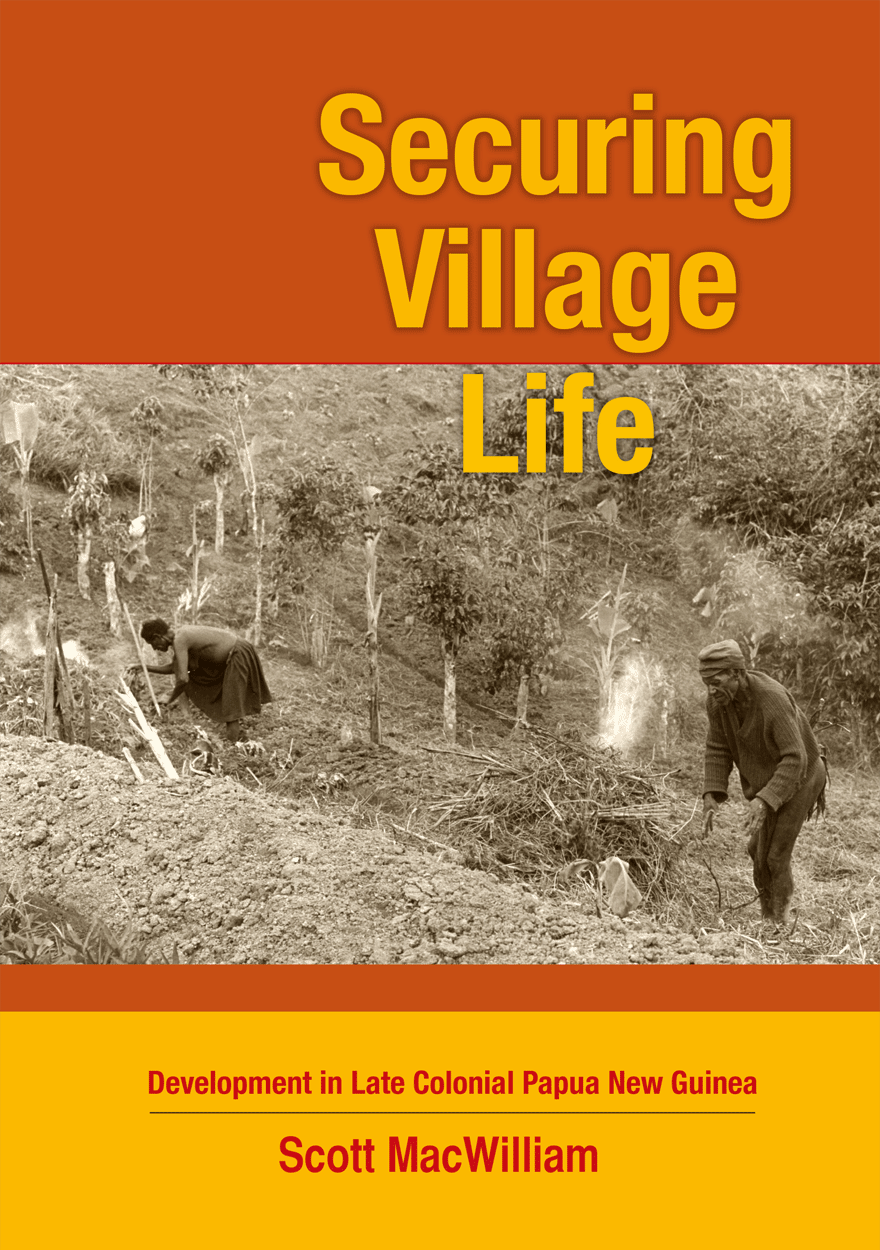
Securing Village Life »
Development in Late Colonial Papua New Guinea
Authored by: Scott MacWilliam
Publication date: May 2013
Securing Village Life: Development in Late Colonial Papua New Guinea examines the significance for post-World War II Australian colonial policy of the modern idea of development. Australian officials emphasised the importance of bringing development for both the colony of Papua and the United Nations Trust Territory of New Guinea. The principal form that development took involved securing smallholders against the tendencies of other forms of capitalist development that might have separated households from land. In order to make household occupation of their holdings more secure and at higher standards of living, the colonial administration coordinated and supervised increases in production of crops and other agricultural produce.
Contrary to suggestions that colonial policy and practice ignored indigenous agriculture and concentrated on plantation crops grown by international firms and expatriate owner-occupiers, the study shows how the main focus was instead upon increasing smallholder output for immediate consumption as well as for local and international markets. Simultaneously development stimulated increases in consumption, including of goods produced through manufacturing processes and imported into the colony.
Only as Independence approached was the pre-eminence of the earlier focus upon smallholders weakened. In part the change occurred due to the political advance of the indigenous capitalist class and their allies seeking to extend their base in largeholding agriculture and related commercial activities. This advance and the uncertainty over which form of development would prevail once indigenes held state power in post-colonial Papua New Guinea stood in marked contrast to the definite direction pursued under the colonial administration of the 1950s and early 1960s.
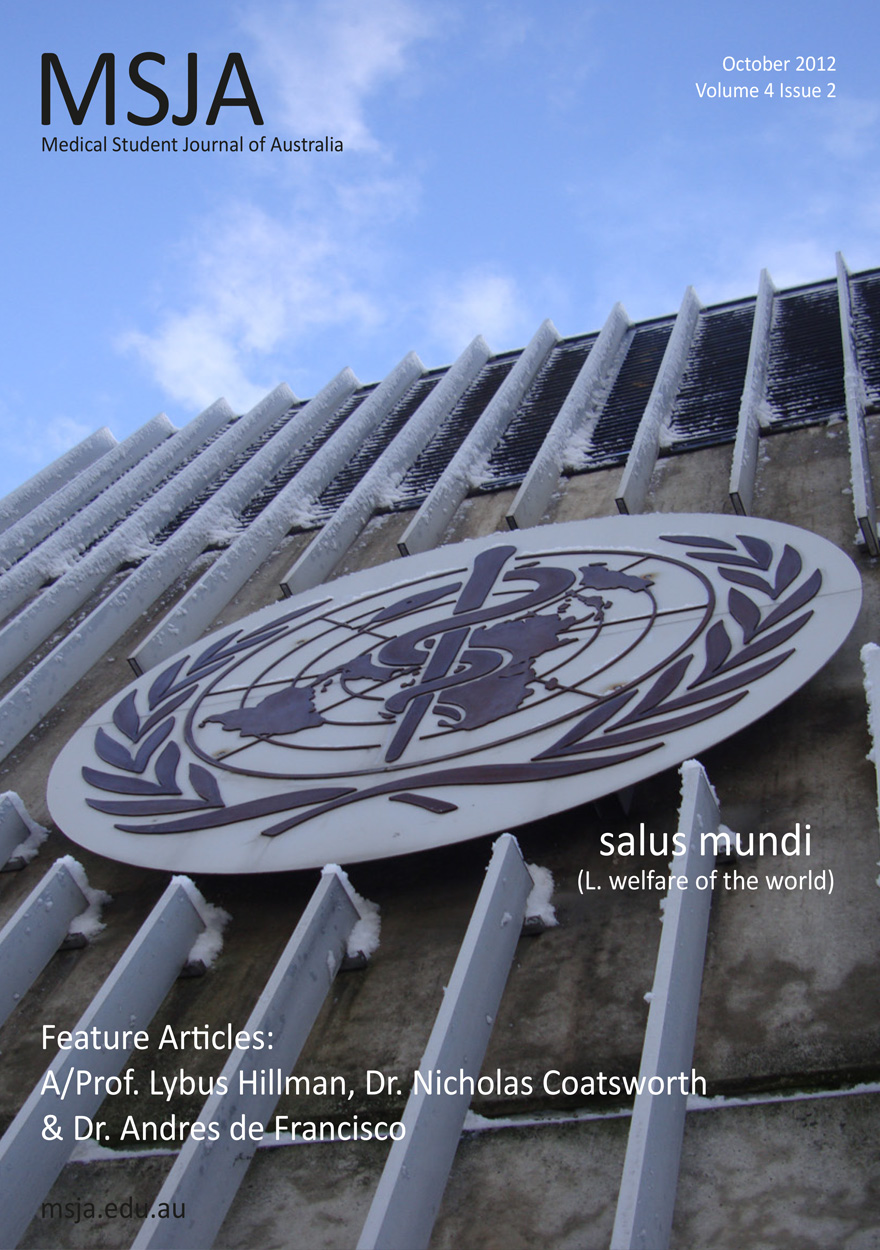
Medical Student Journal of Australia: Volume Four, Issue 2 »
Publication date: May 2013
The Medical Student Journal of Australia provides the medical school of The Australian National University with a platform for medical students to publish their work in a peer-reviewed journal, communicating the results of medical and health research information clearly, accurately and with appropriate discussion of any limitations or potential bias.
Download for free
Not available for purchase

Japan's Failed Revolution »
Koizumi and the Politics of Economic Reform
Authored by: Aurelia George Mulgan
Publication date: May 2013
Japan’s Failed Revolution: Koizumi and the Politics of Economic Reform asks why, despite all the high expectations, the Japanese public’s desire for economic reform, and leadership of a majority coalition in a parliamentary democracy, the reformer Prime Minister Koizumi has not achieved the economic reforms expected of him since he surprisingly attained power over a year ago. To unravel this ‘puzzle’, Aurelia George Mulgan eschews the simplicities of both cultural and rational choice explanations and systematically tests the propositions in the comparative literature on ‘failed reform’. The result is one of the best books ever written about contemporary Japanese politics. It explains how, despite British-style parliamentary institutions, Japan’s very ‘un-Westminster’ traditional policymaking process involving the ruling party and the bureaucracy’s structure and linkage has stymied and will probably continue to stymie even a sincere and active Prime Minister’s best reform intentions. This book should be read by all political scientists, journalists, economists, and students interested in contemporary Japan.
Ellis S. Krauss
Graduate School of International Relations and Pacific Studies
University of California, San Diego.
The author takes a scalpel to dissect Japan’s dysfunctional political system. She shows with wonderful clarity and depth of knowledge why the Koizumi reforms are not succeeding, and why revolutionary political change is needed as a precondition for economic recovery. The book should be required reading for anyone involved with contemporary Japan.
J.A.A. Stockwin
University of Oxford.
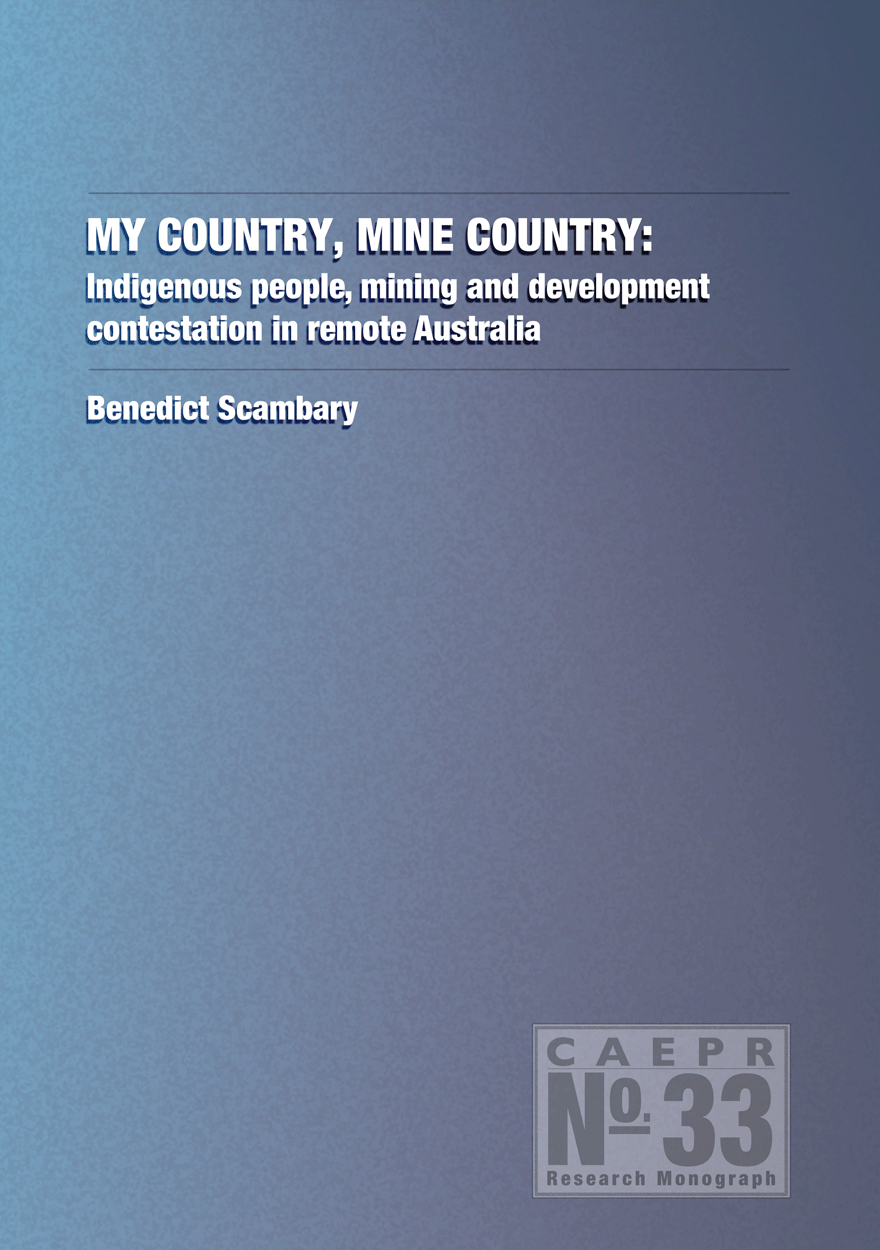
My Country, Mine Country »
Indigenous people, mining and development contestation in remote Australia
Authored by: Benedict Scambary
Publication date: May 2013
Agreements between the mining industry and Indigenous people are not creating sustainable economic futures for Indigenous people, and this demands consideration of alternate forms of economic engagement in order to realise such ‘futures’. Within the context of three mining agreements in north Australia this study considers Indigenous livelihood aspirations and their intersection with sustainable development agendas. The three agreements are the Yandi Land Use Agreement in the Central Pilbara in Western Australia, the Ranger Uranium Mine Agreement in the Kakadu region of the Northern Territory, and the Gulf Communities Agreement in relation to the Century zinc mine in the southern Gulf of Carpentaria in Queensland.
Recent shifts in Indigenous policy in Australia seek to de-emphasise the cultural behaviour or imperatives of Indigenous people in undertaking economic action, in favour of a mainstream conventional approach to economic development. Concepts of ‘value’, ‘identity’, and ‘community’ are key elements in the tension between culture and economics that exists in the Indigenous policy environment. Whilst significant diversity exists within the Indigenous polity, Indigenous aspirations for the future typically emphasise a desire for alternate forms of economic engagement that combine elements of the mainstream economy with the maintenance and enhancement of Indigenous institutions and ‘livelihood’ activities. Such aspirations reflect ongoing and dynamic responses to modernity, and typically concern the interrelated issues of access to and management of ‘country’, the maintenance of Indigenous institutions associated with family and kin, access to resources such as cash and vehicles, the establishment of robust representative organisations, and are integrally linked to the derivation of both symbolic and economic value of livelihood pursuits.

Pacific Missionary George Brown 1835–1917 »
Wesleyan Methodist Church
Authored by: Margaret Reeson
Publication date: April 2013
George Brown (1835-1917) was many things during his long life; leader in the Wesleyan Methodist Church in Australasia, explorer, linguist, political activist, apologist for the missionary enterprise, amateur anthropologist, writer, constant traveller, collector of artefacts, photographer and stirrer. He saw himself, at heart, as a missionary. The islands of the Pacific Ocean were the scene of his endeavours, with extended periods lived in Samoa and the New Britain region of today’s Papua New Guinea, followed by repeated visits to Tonga, Fiji, the Milne Bay region of Papua New Guinea and the Solomon Islands. It could be argued that while he was a missionary in the Pacific region he was not a pacific missionary. Brown gained unwanted notoriety for involvement in a violent confrontation at one point in his career, and lived through conflict in many contexts but he also frequently worked as a peace maker. Policies he helped shape on issues such as church union, indigenous leadership, representation by lay people and a wider role for women continue to influence Uniting Church in Australia and churches in the Pacific region. His name is still remembered with honour in several parts of the Pacific. Brown’s marriage to Sarah Lydia Wallis, daughter of pioneer missionaries to New Zealand, was long and rich. Each strengthened the other and they stand side by side in this account.
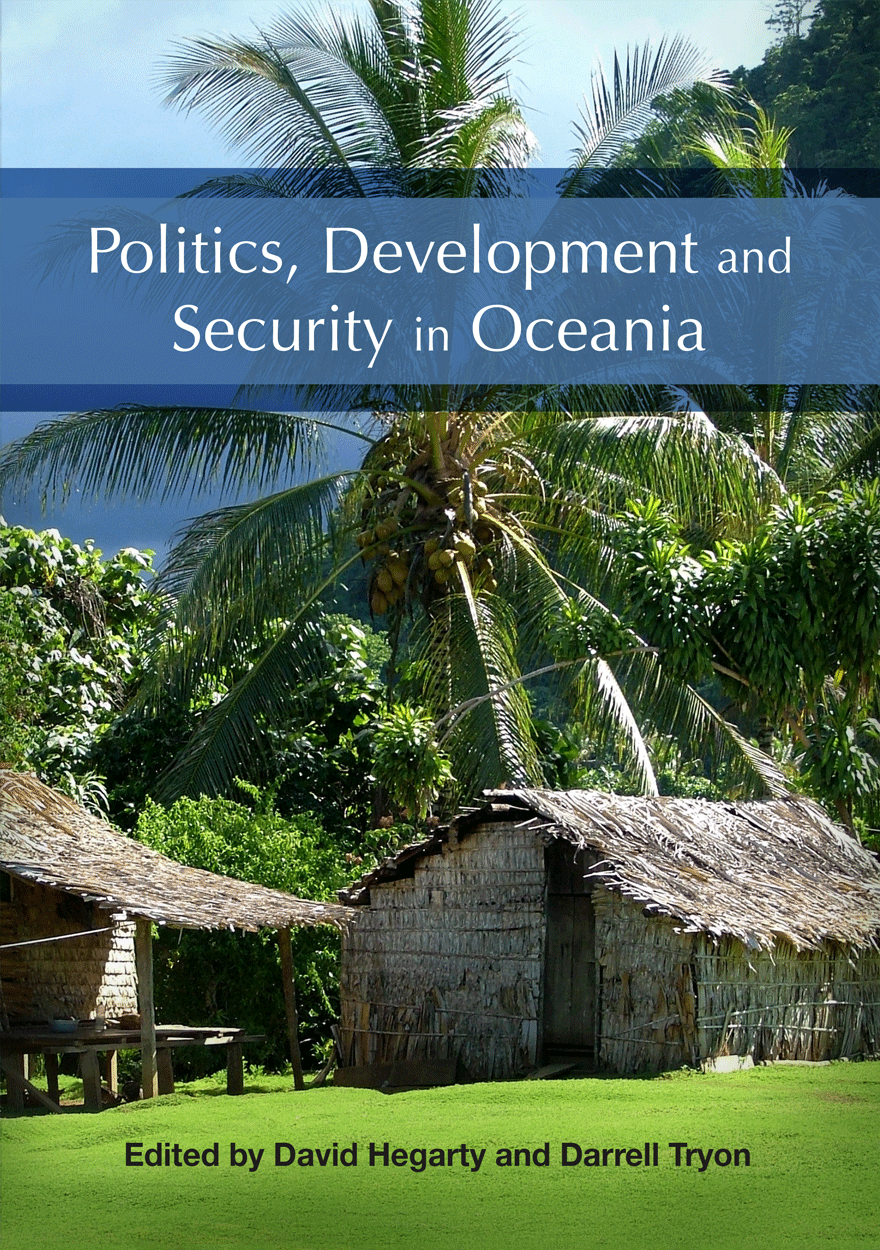
Politics, Development and Security in Oceania »
Edited by: David Hegarty, Darrell Tryon
Publication date: April 2013
The chapters in this volume canvass political change and development across the Pacific Islands from a variety of perspectives, each contributing to the analysis of a region growing in complexity and in confidence. They fall neatly into three sections: Oceania and its Inheritance; Oceania – Current Needs and Challenges; and Oceania and its Wider Setting.
The new states of the Pacific have demonstrated considerable resilience, and in many cases, an extraordinary capacity to bounce back from difficulty and to maintain optimism for the future. The continuing professionalisation of public management across the region is building on that tradition. The growth of civil society organisations is also beginning to play a positive role in policy and implementation. Donors are becoming more coherent in their strategies, more attuned to the realities of generating development outcomes in small island states, and are beginning to acknowledge and map progress.
This book explores these themes of governance, development and security that signal both continuity and change in the Pacific’s pattern of islands.
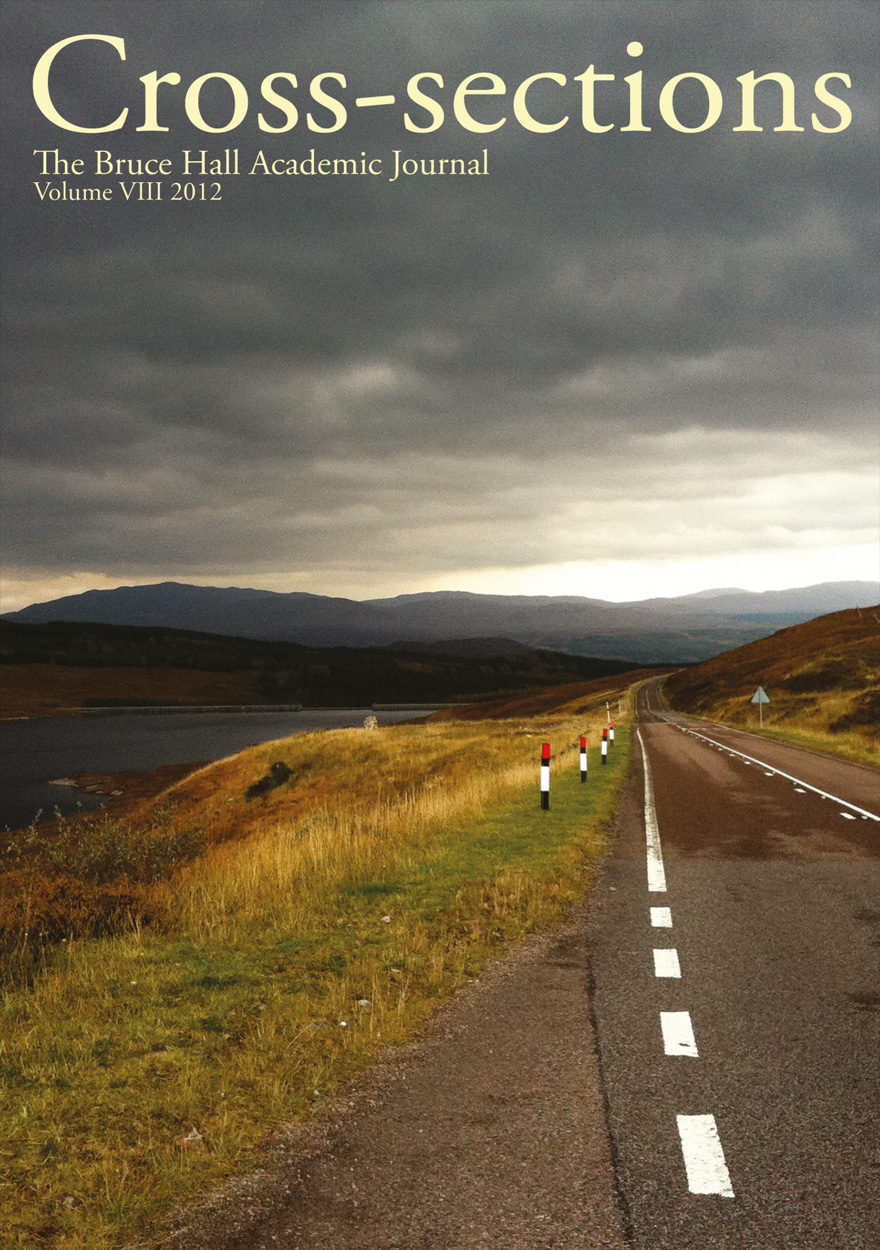
Cross-sections, The Bruce Hall Academic Journal: Volume VIII, 2012 »
Publication date: April 2013
Representing the combined energies of a large group of authors, editors, artists and researchers associated with Bruce Hall at the ANU, Cross-sections collects a range of works (from academic articles and essays to photography, digital art and installation artwork) that represents the disciplinary breadth and artistic vitality of the ANU.
Presenting a challenging and absorbing way for students to hone vital research skills, in the process, Cross-sections nurtures a fruitful environment of collaborative interaction between academics and students.
Download for free
Not available for purchase

Corruption and Anti-Corruption »
Edited by: Peter Larmour, Nick Wolanin
Publication date: March 2013
There is new international attention being given to the old problem of corruption. It has been taken up by international organisations, and driven by economic analysis. It is impatient of cultural justifications, and suspicious of state action. It is concerned with corruption prevention as much as detection, investigation and prosecution.
Corruption and Anti-Corruption deals with the international dimensions of corruption, including campaigns to recover the assets of former dictators, and the links between corruption, transnational and economic crime. It deals with corruption as an issue in political theory, and shows how it can be addressed in campaigns for human rights. It also presents case studies of reform efforts in Philippines, India and Thailand.
The book explains the doctrines of a well-established domestic anticorruption agency. It is based on research to develop a curriculum for a unique international training course on ‘Corruption and Anti-Corruption’, designed and taught by academics at The Australian National University, the Australian Institute of Criminology and public servants in the New South Wales Independent Commission Against Corruption. Versions have been taught in Canberra, and several countries in South East Asia.
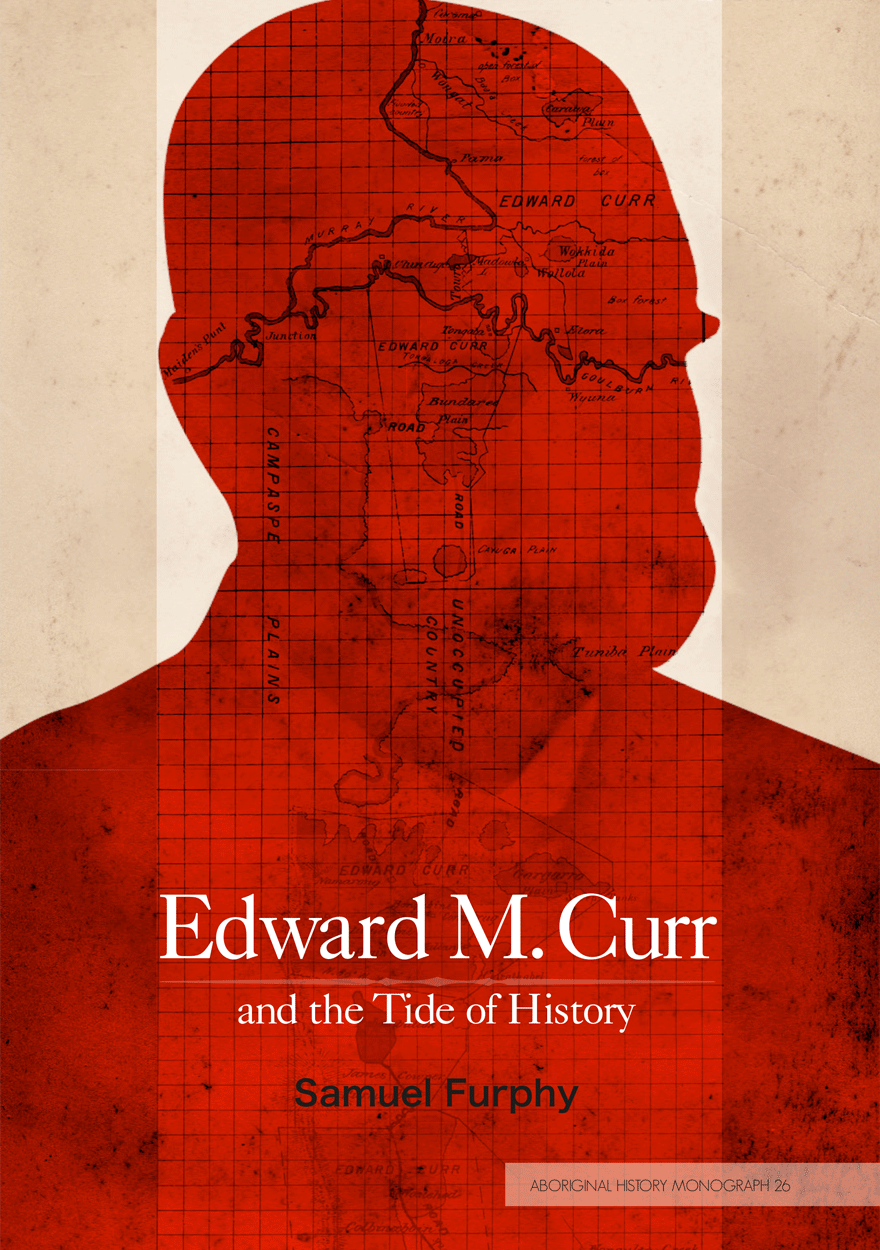
Edward M. Curr and the Tide of History »
Authored by: Samuel Furphy
Publication date: March 2013
Edward M. Curr (1820–89) was a pastoralist, horse trader, stock inspector, Aboriginal administrator, author and ethnologist. A prominent figure in the history of the Colony of Victoria, he rose to a senior position in the public service and authored several influential books and essays. He is best remembered for his nostalgic memoir, Recollections of Squatting in Victoria (1883), which has become a standard historical source.
This book is the first comprehensive biography of Curr and explores both his life and legacy. In particular, it considers his posthumous influence on the Yorta Yorta native title case (1994–2001), when his written account of the Yorta Yorta ancestors played a key role in the failure of the claim. By exploring Curr’s interactions with Aboriginal people—as a pastoralist and Aboriginal administrator—this book advocates a more nuanced, critical, and historically informed interpretation of Curr’s ethnological writings than was evident in the Yorta Yorta case.
For more information on Aboriginal History Inc. please visit aboriginalhistory.org.au.

The Governance of Common Property in the Pacific Region »
Edited by: Peter Larmour
Publication date: March 2013
In a region where mining, forestry, fish and other primary resources are so basic to income, employment and national prosperity, an understanding of rights to land, water and minerals is fundamental. Tenure regimes in the Asia-Pacific region are vastly more diverse and complex than in those of any other part of the world for comparable population numbers. These studies will overcome the simplistic misunderstandings that have obscured understanding in so many instances.
This book provides an up-to-date overview of the main patterns of indigenous property rights, particularly those held by corporate groups, in the South Pacific Forum region (Australia, New Zealand and the independent Pacific island nations) plus a valuable comparative chapter on Canada. It explores the relative success and failure of a variety of approaches to the management of these complex systems, and offers insights and suggestions for the amelioration of present and likely future stresses in the systems. It is a valuable contribution to the understanding of both governance and property, and to the effective sociopolitical development of the region.
- Ron Crocombe, Emeritus Professor, University of the South Pacific

Mr Tulsi's Store »
A Fijian journey
Authored by: Brij V. Lal
Publication date: March 2013
Professor Lal has been remarkably successful in combining scholarship with autobiography in Mr Tulsi’s Store. In the essays which cover the author’s childhood and education up to university, diligent scholarship combines with evocative autobiographical details to reveal a philosophical pattern that encompasses the experience of the descendants of all Indian indentured workers everywhere.
Professor Frank Birbalsingh
York University
Canada

Protection of intellectual, biological & cultural property in Papua New Guinea »
Edited by: Kathy Whimp, Mark Busse
Publication date: March 2013
Intellectual, biological and cultural property rights are a powerful and debatable topic. They offer the possibility for protection of rights to intangible resources, including the products of knowledge and creativity. The forces of globalisation have made this subject of immediate, international concern. Struggles for ownership of intellectual property occur between and within local and global arenas.
This book examines important questions which Papua New Guinea must ask in the development of intellectual property legislation. The chapters are written by specialists in the fields of medicine, law, the environment, music, genetics and traditional cultural knowledge.
The wise and creative protection of intellectual, biological and cultural property is important if Papua New Guinea is to successfully define and realise its future. This book is for all those interested in finding the best policies for protecting these rights wherever they may live and work.
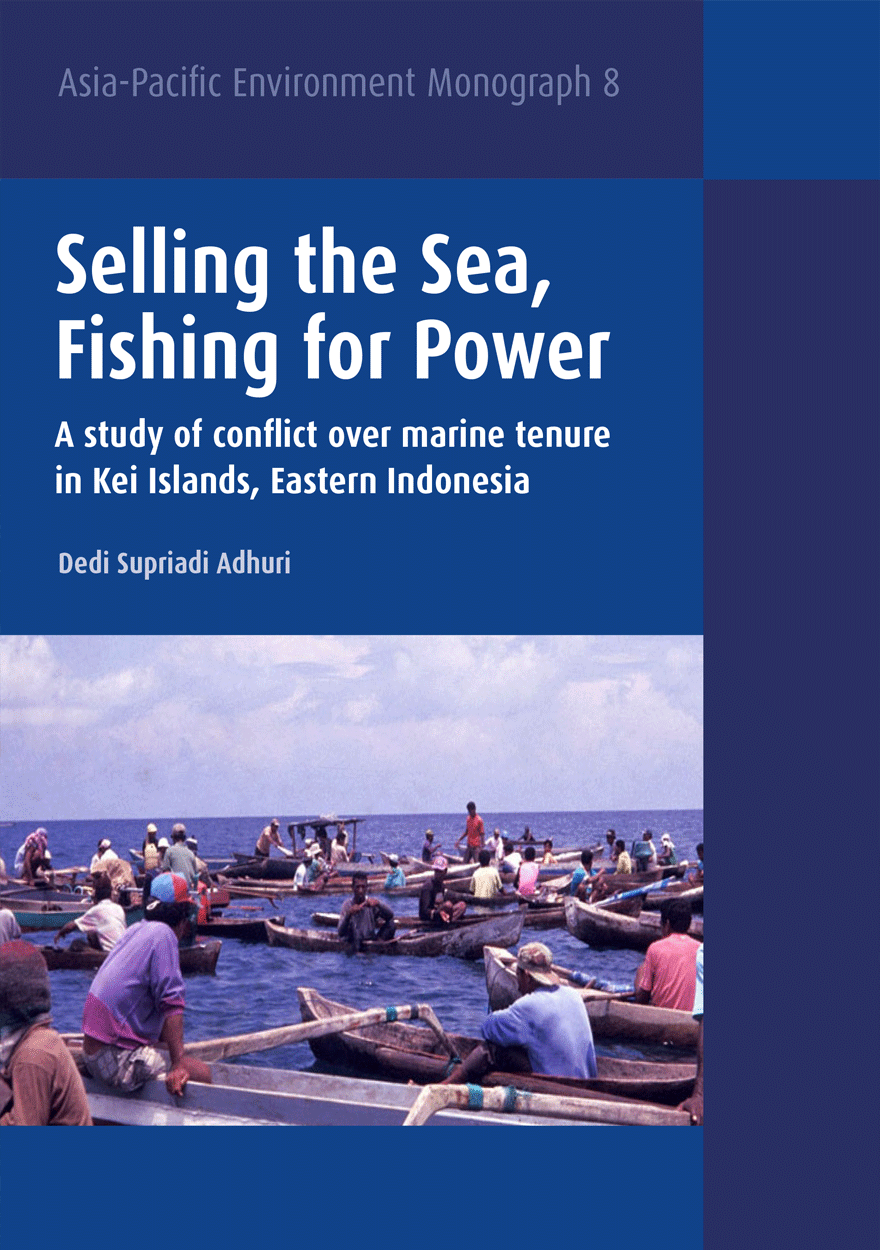
Selling the Sea, Fishing for Power »
A study of conflict over marine tenure in Kei Islands, Eastern Indonesia
Authored by: Dedi Supriadi Adhuri
Publication date: March 2013
By analysing various conflicts, this book discusses the social, political, economic and legal attributes that are attached to the practice of traditional (communal) marine tenure. Selling the Sea pushes the discourse beyond the conventional approach which looks at marine tenure only as a means of resource management, and offers a more comprehensive understanding of what marine tenure is. For those working in the areas of marine resource management and fisheries, this book is a critical but also complementary reading to the conventional discourse on the issue.

Turnings »
Fiji Factions
Authored by: Brij V. Lal
Publication date: March 2013
Through Dr Lal’s refreshingly clear and powerful prose and sharply observed stories, we enter the inner world of Indo-Fijian feeling and aspiration. One universal that emerges with particular clarity in the Indo-Fijian experience is the ceaseless struggle to find community in a changing world, balancing the beauty of ritual and tradition against the transcendent value of education and modern rationality. The volume poses the question of how people draw upon historical memory and immediate circumstances to create a social world, and how that world can be shared with others in multicultural society. The answer seems to lie somewhere between history and poetry, as in Dr Lal’s ‘factions.’
Andrew Arno
University of Hawaii
at Manoa, Honolulu

East Asia Forum Quarterly: Volume 5, Number 1, 2013 »
Publication date: March 2013
East Asia Forum Quarterly grew out of East Asia Forum (EAF) online, which has developed a reputation for providing a platform for the best in Asian analysis, research and policy comment on the Asia Pacific region in world affairs. EAFQ aims to provide a further window onto research in the leading research institutes in Asia and to provide expert comment on current developments within the region. The East Asia Forum Quarterly, like East Asia Forum online, is an initiative of the East Asia Forum (EAF) and its host organisation, the East Asian Bureau of Economic Research (EABER) in the Crawford School of Economics and Government in the College of Asia & the Pacific at The Australian National University.
Download for free
Not available for purchase



